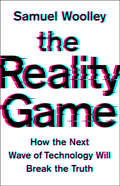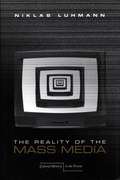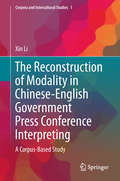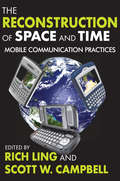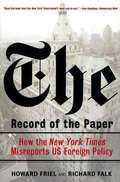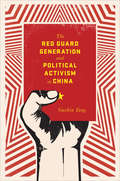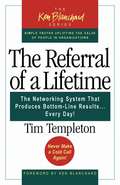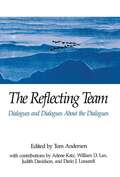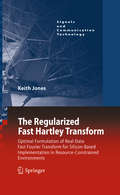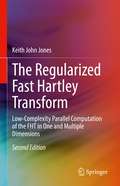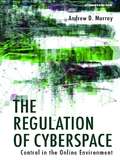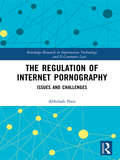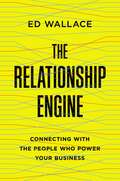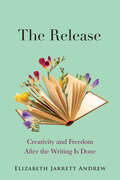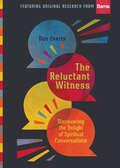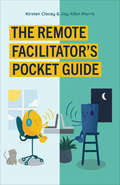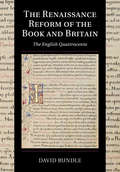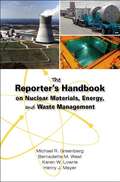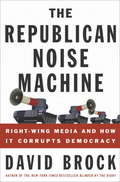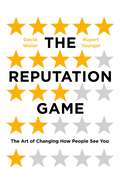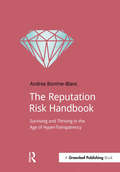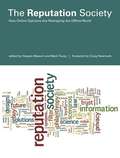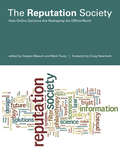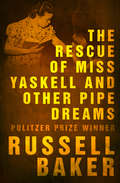- Table View
- List View
The Reality Game: How the Next Wave of Technology Will Break the Truth
by Samuel WoolleyFake news posts and Twitter trolls were just the beginning. What will happen when misinformation moves from our social media feeds into our everyday lives?Online disinformation stormed our political process in 2016 and has only worsened since. Yet as Samuel Woolley shows in this urgent book, it may pale in comparison to what's to come: humanlike automated voice systems, machine learning, "deepfake" AI-edited videos and images, interactive memes, virtual reality, and more. These technologies have the power not just to manipulate our politics, but to make us doubt our eyes and ears and even feelings.Deeply researched and compellingly written, The Reality Game describes the profound impact these technologies will have on our lives. Each new invention built without regard for its consequences edges us further into this digital dystopia.Yet Woolley does not despair. Instead, he argues pointedly for a new culture of innovation, one built around accountability and especially transparency. With social media dragging us into a never-ending culture war, we must learn to stop fighting and instead prevent future manipulation. This book shows how we can use our new tools not to control people but to empower them.
The Reality of the Mass Media (Cultural Memory in the Present)
by Niklas Luhmann Kathleen Cross<p>In The Reality of the Mass Media, Luhmann extends his theory of social systems—applied in his earlier works to the economy, the political system, art, religion, the sciences, and law—to an examination of the role of mass media in the construction of social reality. <p>Luhmann argues that the system of mass media is a set of recursive, self-referential programs of communication, whose functions are not determined by the external values of truthfulness, objectivity, or knowledge, nor by specific social interests or political directives. Rather, he contends that the system of mass media is regulated by the internal code information/noninformation, which enables the system to select its information (news) from its own environment and to communicate this information in accordance with its own reflexive criteria. <p>Despite its self-referential quality, Luhmann describes the mass media as one of the key cognitive systems of modern society, by means of which society constructs the illusion of its own reality. The reality of mass media, he argues, allows societies to process information without destabilizing social roles or overburdening social actors. It forms a broad reservoir (memory) of options for the future coordination of action, and it provides parameters for the stabilization of political reproduction of society, as it produces a continuous self-description of the world around which modern society can orient itself. <p>In his discussion of mass media, Luhmann elaborates a theory of communication in which communication is seen not as the act of a particular consciousness, nor the medium of integrative social norms, but merely the technical codes through which systemic operations arrange and perpetuate themselves.</p>
The Reconstruction of Modality in Chinese-English Government Press Conference Interpreting: A Corpus-Based Study (Corpora and Intercultural Studies #1)
by Xin LiThis book investigates a special genre of interpreting in the Chinese context, namely Government Press Conference (GPC) Interpreting. Drawing on the modality system from Systemic Functional Grammar and a corpus of 21 interpreting events, the project explores the regular patterns of modality shifts in Chinese-English GPC interpreting and seeks explanations in the sociocultural context. As a corpus-based project, the book covers qualitative analysis of the sociocultural context, qualitative analysis of the interpersonal effects of modality shifts, and quantitative analysis of modality shifts. This book will contribute to the understanding of the distinctive features of GPC interpreting in China, shed new light on the rendition of modality between Chinese and English in specific contexts, and also inspire new thoughts on the nature of interpreting in general.
The Reconstruction of Space and Time: Mobile Communication Practices
by Rich LingOne of the most significant and obvious examples of how mobile communication influences our understanding of time and space is how we coordinate with one another. Mobile communication enables us to call specific individuals, not general places. Regardless of location, we are able to make contact with almost anyone, almost anywhere. This advancement has changed, and continues to change, human interaction. Now, instead of agreeing on a particular time well beforehand, we can iteratively work out the most convenient time and place to meet at the last possible moment--on the way to the meeting or once we arrive at the destination.In their early days, mobile devices were primarily used for various types of emergency situations and for work. In some cases, the device was an essential element in various business operations or used so that overseas workers could communicate with their families. The distance between a remote posting and the people back home was suddenly and dramatically reduced. People began to share these devices not necessarily out of economic issues, but also questions of family and interpersonal dynamics.The process of sharing decisions as to who is a legitimate partner makes the nature of relationships more explicit. By examining the economy of sharing, we not only see how sharing mobile phones restructures social space, but are also given insight into an individual's web of interactions. This cutting-edge book deals with modern ways of thinking about communication and human interaction; it will illuminate the ways in which mobile communication alters our experience with space and time.
The Record Of The Paper: How The New York Times Misreports U.S. Foreign Policy
by Howard Friel Richard FalkOn May 26, 2004, the New York Times issued an apology for its coverage of Iraq's purported weapons of mass destruction. The Times had failed to provide what most readers expect from the US newspaper of record: journalistic accuracy and integrity about important matters of US foreign policy. But the Times' coverage of Iraq was worse than they were willing to concede. In fact, for at least the past fifty years the editorial policy of the Times--from its coverage of the 1954 Geneva Accords on Vietnam to the issue of torture in Abu Ghraib--has failed to incorporate international law into its coverage of US foreign policy. This lapse, as the authors demonstrate, has profound implications for the quality of the Times' journalism and the function of the press in a country supposedly governed by the rule of law. In this meticulously researched study, Howard Friel and Richard Falk reveal how the Times has consistently misreported major US foreign policy issues, including the bombing of North Vietnam in response to the Tonkin Gulf and Pleiku incidents in 1964-65, the Reagan administration's policy toward the Sandinista government of Nicaragua in the 1980s, the 2002 military coup that briefly overthrew Hugo Chavez, Venezuela's elected president, and the Bush administration's 2003 invasion of Iraq.
The Red Guard Generation and Political Activism in China (Studies of the Weatherhead East Asian Institute, Columbia University)
by Guobin YangRaised to be "flowers of the nation," the first generation born after the founding of the People's Republic of China was united in its political outlook and at first embraced the Cultural Revolution of 1966, but then split into warring factions. Investigating the causes of this fracture, Guobin Yang argues that Chinese youth engaged in an imaginary revolution from 1966 to 1968, enacting a political mythology that encouraged violence as a way to prove one's revolutionary credentials. This same competitive dynamic would later turn the Red Guard against the communist government.Throughout the 1970s, the majority of Red Guard youth were sent to work in rural villages, where they developed an appreciation for the values of ordinary life. From this experience, an underground cultural movement was born. Rejecting idolatry, these relocated revolutionaries developed a new form of resistance that signaled a new era of enlightenment, culminating in the Democracy Wall movement of the late 1970s and the Tiananmen protest of 1989. Yang's final chapter on the politics of history and memory argues that contemporary memories of the Cultural Revolution are factionalized along these lines of political division, formed fifty years before.
The Referral of a Lifetime: The Networking System That Produces Bottom-Line Results... Every Day!
by Timothy L. Templeton Lynda Rutledge StephensonIn "The Referral of a Lifetime", author Tim Templeton frames a powerful plan for cultivating clients and customers in a fable about businesswoman Susie McCumber, who feels increasingly like a failure. A friend refers her to the mysterious Mr. Highground, who introduces her to four successful people. They show her how they transformed their businesses and their lives by determining how others view them and how they view themselves as both human beings and businesspeople. Each of the four represents a "type" in this schema -- from the "relational/business" type who puts the relationship first but thinks strategically when the talk turns to business, to the "business/business" type, who avoids relationships unless they work to a business advantage. Templeton shows how understanding one's type allows one to showcase strengths while improving weak areas in this simple, easy-to-use guide to success in business and in life.
The Reflecting Team: Dialogues and Dialogues About the Dialogues
by Tom AndersenWhat happens when the barriers between therapists and clients are removed, when they all participate in a dialogue about change, and when therapists and clients even trade places? As Lynn Hoffman says in her forward to this remarkable book, it "dramatically alters a family's position in relation to the professionals they have come to see." In the process, it changes the roles, rules, and expectations of therapy. Operating within the reflecting team format, professionals meet clients without preexisting hypotheses. Together they engage in a conversation that becomes a search for the not-yet-seen and the not-yet-thought-of, as well as for alternative understandings of what has been defined as problematic. As clients and therapists trade places and various members of the entire group participate in conversations, the possibilities for change open wide. This book describes the evolution of this radical strategy in Tromso, Norway, and its adaptation by various family therapists in the United States. It begins in Part I with a description of the settings in which the reflecting team developed and its history and evolution. Then basic concepts, practical considerations, and guidelines for practice are detailed. Part II contains Dialogues About the Dialogues, that is, reflections on the client-therapist-consultant-team dialogues that distinguish this innovative approach to therapy. As roles shift and various participants offer definitions of the problem and possible solutions, traditional ideas about the boundaries of a "case study" are shattered. Readers will find that this fluid, encompassing perspective stimulates their own thoughts about therapy, shaking them from outgrown assumptions. Since this approach is still evolving, the final chapter is, appropriately, a reflection on the changes that have taken place since the European edition of this book was published.
The Regularized Fast Hartley Transform
by Keith JonesThe Regularized Fast Hartley Transform provides the reader with the tools necessary to both understand the proposed new formulation and to implement simple design variations that offer clear implementational advantages, both practical and theoretical, over more conventional complex-data solutions to the problem. The highly-parallel formulation described is shown to lead to scalable and device-independent solutions to the latency-constrained version of the problem which are able to optimize the use of the available silicon resources, and thus to maximize the achievable computational density, thereby making the solution a genuine advance in the design and implementation of high-performance parallel FFT algorithms.
The Regularized Fast Hartley Transform: Low-Complexity Parallel Computation of the FHT in One and Multiple Dimensions
by Keith John JonesThis book describes how a key signal/image processing algorithm – that of the fast Hartley transform (FHT) or, via a simple conversion routine between their outputs, of the real‑data version of the ubiquitous fast Fourier transform (FFT) – might best be formulated to facilitate computationally-efficient solutions. The author discusses this for both 1-D (such as required, for example, for the spectrum analysis of audio signals) and m‑D (such as required, for example, for the compression of noisy 2-D images or the watermarking of 3-D video signals) cases, but requiring few computing resources (i.e. low arithmetic/memory/power requirements, etc.). This is particularly relevant for those application areas, such as mobile communications, where the available silicon resources (as well as the battery-life) are expected to be limited. The aim of this monograph, where silicon‑based computing technology and a resource‑constrained environment is assumed and the data is real-valued in nature, has thus been to seek solutions that best match the actual problem needing to be solved.
The Regulation of Cyberspace: Control in the Online Environment
by Andrew MurrayExamining the development and design of regulatory structures in the online environment, The Regulation of Cyberspace considers current practices and suggests a regulatory model that acknowledges its complexity and how it can be used by regulators to provide a more comprehensive regulatory structure for cyberspace. Drawing on the work of cyber-regulatory theorists, such as Yochai Benkler, Andrew Shapiro and Lawrence Lessig, Murray explores and analyzes how all forms of control, including design and market controls, as well as traditional command and control regulation, are applied within the complex and flexible environment of cyberspace. It includes chapters on: the role of the cyberlawyer environmental design and control online communities cyber laws and cyber law-making. This book is an essential read for anyone interested in law and information technology.
The Regulation of Internet Pornography: Issues and Challenges (Routledge Research in Information Technology and E-Commerce Law)
by Abhilash NairThe regulation of pornography has always been a contentious issue, which has sparked wide-ranging debates surrounding the acceptability and place of pornography in society. The use of the internet to distribute and access pornography has magnified this debate and has presented a number of challenges for the law in terms of effective and proportionate regulation. Following unsuccessful attempts by states to transpose traditional laws to cyberspace, a new and radical regulatory framework eventually evolved for regulating internet pornography. In this process, the focus of the law has changed from merely controlling the publication and distribution of obscene material to a model that aims to deter private consumption of illegal content. In addition, various self- and co-regulatory initiatives have been introduced with the involvement of non-state actors, imposing a certain degree of de facto liability on intermediaries, all of which raise interesting issues. This book examines the relevant regulatory responses to internet pornography, with particular reference to the UK, but also drawing comparisons with other countries where relevant. It argues that the internet has fundamentally, and in many ways irreversibly, changed the regulation of pornography. Classifying internet pornography into three broad categories – child pornography, extreme pornography, and adult pornography – the book provides an in-depth analysis of the legal issues involved in regulating internet pornography, and argues that the notions of obscenity and indecency on their own will not provide an adequate basis for regulating online pornography. The book identifies the legitimising factors that will lend credibility and normative force to the law in order to successfully regulate pornography in cyberspace. It is the only comprehensive text that rigorously addresses the regulation of internet pornography as a whole, and offers valuable insights that will appeal to academics, students, policy makers, and those working in the areas of broader internet governance and online child protection.
The Relationship Engine: Connecting with the People Who Power Your Business
by Ed WallaceRelationships hold companies together and fuel future growth. From connecting with customers to forging high-performing teams, success depends on everyone working well together. Yet many leaders prioritize potential relationships and take established ones for granted. They shouldn't. Research reveals that these core relationships are often the weakest...and can prove more vital than missed networking opportunities.Whether working with employees or associates, vendors or customers, The Relationship Engine gives you the tools you need to become an intentional, masterful relationship-builder. The book helps you establish common ground, focus on collaboration instead of command, put people before process, demonstrate worthy intent, and make every interaction matter. This insightful and practical guide includes:A powerful RQ Assessment designed to measure and evaluate business relationshipsA Relational Agility Action PlannerLateral and vertical relationship strategy templatesAnd moreEven the best-laid strategic plans are worthless without caring, real-life connections. It's time to invest in the bonds that will drive sustainable success.
The Release: Creativity and Freedom After the Writing Is Done
by Elizabeth Jarrett AndrewThe release is the stage when writers share the soul of their project—its gift. Here’s how to thrive and best serve your work once the writing is done.In The Release, award-winning author and teacher Elizabeth Jarrett Andrew invites writers to lift their heads out of the product-oriented sandbox and find an alternative way to play. By returning writers to their original delight and guiding them in an ongoing creative practice, Andrew helps form habits of mind, heart, and body to support a project’s final flourishing, free from the burdens of seeking validation and measuring worth.With the same skill and compassion she brought to her other resources for writers—Writing the Sacred Journey: The Art and Practice of Spiritual Memoir and Living Revision: A Writer's Craft as Spiritual Practice—Andrew writes with deep empathy for the emotional journey when a work is done, through celebration and grief, decisions around publication, the angst of receiving negative feedback or rejection, and the sometimes surprising challenges that come with success.Anyone—amateurs and professionals alike, those who intend to publish and those who do not, those with book-length manuscripts and those with haiku written on paper scraps—can do this practice. This book is for anyone who wants to release their work with love.
The Reluctant Witness: Discovering the Delight of Spiritual Conversations (Lutheran Hour Ministries Resources)
by Don EvertsNew research finds that Christians are less involved in spiritual conversations today than we were twenty-five years ago. As society has changed, it seems we have become more uncomfortable talking with people about our faith. We are reluctant conversationalists. The reality is that many of our churches and communities are shrinking instead of growing. What can we do about this? Don Everts, himself a reluctant witness, grew up assuming that spiritual conversations are always painful and awkward. But after falling into one spiritual conversation after another, he was surprised to discover that they aren't. Don's surprising—and sometimes embarrassing—stories affirm what Scripture and the latest research reveal: spiritual conversations can actually be a delight. Unpacking what God's Word says about spiritual conversations and digging into the habits of eager conversationalists, Everts describes what we can learn from Christians who are still talking about their faith. With original research from the Barna Group and Lutheran Hour Ministries on spiritual conversations in the digital age, this book offers fresh insights and best practices for fruitful everyday conversations.
The Remote Facilitator's Pocket Guide: How Local Businesses Are Beating the Global Competition
by Kirsten Clacey Jay-Allen MorrisThis approach to remote facilitation makes virtual meetings powerful means of collaboration using proven techniques to accommodate a diversity of cultures, locations, and personalities.Many people struggle with remote meetings: a cocktail of factors, such as technical barriers and invisible group norms, increase the uncertainty and risk of the already vulnerable task of collaborating and sharing ideas. When remote meetings go badly, they go really badly. Few things feel as lonely and intimidating as speaking to a screen with unreadable faces staring back in silence. This book will help you improve the quality of your remote meetings. With a little awareness, some planning, and some practice, you can make your remote meetings an effective, engaging, and powerful mechanism for collaboration within your organization. This book is for anyone seeking to get more value from remote meetings. Whether you're a seasoned facilitator, a new facilitator, or someone hoping to improve team meetings, you will be empowered with principles and actionable methods to enhance your organization's effectiveness.
The Renaissance Reform of the Book and Britain: The English Quattrocento (Cambridge Studies in Palaeography and Codicology #17)
by David RundleWhat has fifteenth-century England to do with the Renaissance? By challenging accepted notions of 'medieval' and 'early modern' David Rundle proposes a new understanding of English engagement with the Renaissance. He does so by focussing on one central element of the humanist agenda - the reform of the script and of the book more generally - to demonstrate a tradition of engagement from the 1430s into the early sixteenth century. Introducing a cast-list of scribes and collectors who are not only English and Italian but also Scottish, Dutch and German, this study sheds light on the cosmopolitanism central to the success of the humanist agenda. Questioning accepted narratives of the slow spread of the Renaissance from Italy to other parts of Europe, Rundle suggests new possibilities for the fields of manuscript studies and the study of Renaissance humanism.
The Reporter's Handbook on Nuclear Materials, Energy & Waste Management
by Michael R. Greenberg Bernadette M. West Karen W. Lowrie Henry J. MayerAn essential reference for journalists, activists, and students, this book presents scientifically accurate and accessible overviews of 24 of the most important issues in the nuclear realm, including: health effects, nuclear safety and engineering, TMI and Chernobyl, nuclear medicine, food irradiation, transport of nuclear materials, spent fuel, nuclear weapons, global warming. Each "brief" is based on interviews with named scientists, engineers, or administrators in a nuclear specialty, and each has been reviewed by a team of independent experts. The objective is not to make a case for or against nuclear-related technologies, but rather to provide definitive background information. (The approach is based on that of The Reporter's Environmental Handbook, published in 1988, which won a special award for journalism from the Sigma Delta Chi Society of professional journalists.)Other features of the book include: a glossary of hundreds of terms, an introduction to risk assessment, environmental and economic impacts, and public perceptions, an article by an experienced reporter with recommendations about how to cover nuclear issues, quick guides to the history of nuclear power in the United States, important federal legislation and regulations, nuclear position statements, and key organizations, print and electronic resources.
The Reporter's Handbook on Nuclear Materials, Energy, and Waste Management
by Michael R. Greenberg Bernadette M. West Karen W. Lowrie Henry J. MayerAn essential reference for journalists, activists, and students, this book presents scientifically accurate and accessible overviews of 24 of the most important issues in the nuclear realm, including: health effects, nuclear safety and engineering, TMI and Chernobyl, nuclear medicine, food irradiation, transport of nuclear materials, spent fuel, nuclear weapons, global warming.Each "brief" is based on interviews with named scientists, engineers, or administrators in a nuclear specialty, and each has been reviewed by a team of independent experts. The objective is not to make a case for or against nuclear-related technologies, but rather to provide definitive background information. (The approach is based on that of The Reporter's Environmental Handbook, published in 1988, which won a special award for journalism from the Sigma Delta Chi Society of professional journalists.)Other features of the book include: a glossary of hundreds of terms, an introduction to risk assessment, environmental and economic impacts, and public perceptions, an article by an experienced reporter with recommendations about how to cover nuclear issues, quick guides to the history of nuclear power in the United States, important federal legislation and regulations, nuclear position statements, and key organizations, print and electronic resources.
The Republican Noise Machine: Right-Wing Media and How It Corrupts Democracy
by David BrockIn The Republican Noise Machine, David Brock skillfully documents perhaps the most important but least understood political development of the last thirty years: how the Republican Right has won political power and hijacked public discourse in the United States.Brock, a former right-wing insider and the author of the New York Times bestseller Blinded by the Right, uses his keen understanding of the strategies, tactics, financing, and personalities of the American right wing to demonstrate how the once-fringe phenomenon of right-wing media has all but subsumed the regular media conversation, shaped the national consciousness, and turned American politics sharply to the right.Brock documents how in the last several decades the GOP built a powerful media machine--newspapers and magazines, think tanks, talk radio networks, op-ed columnists, the FOX News Channel, Christian Right broadcasting, book publishers, and high-traffic internet sites--to sell conservatism to the public and discredit its opponents. This unabashedly biased multibillion-dollar communications empire disregards journalistic ethics and universal standards of fairness and accuracy, manufacturing "news" that is often bought and paid for by a tight network of corporate-backed foundations and old family fortunes. By dissecting the appeal, techniques, and reach of the booming right-wing media market, Brock demonstrates that it is largely based on bigotry, ignorance, and emotional manipulation closely tied to America’s longstanding cultural divisions and the buying power of anti-intellectual traditionalists. From the disputed 2000 presidential election to the war with Iraq to the political battles of 2004, Brock's penetrating analysis of right-wing media theories and methodology reveals that the Republican Right views the media as an extension of a broader struggle for political power. By tracing the political impact of right-wing media, Brock shows how disproportionate conservative influence in the media is integrally linked to the Republican Right’s current domination of all three branches of government, to the propping up of the Bush administration, and to the inability of Democrats to voice their opposition to this political sea change or to compete on an even playing field.As only an ex-conservative intimately familiar with the imperatives of the American right wing could, David Brock suggests ways in which concerned Americans can begin to redress the conservative ascendancy and cut through the propagandistic fog. Writing with verve and deep insight, he reaches far beyond typical bromides about media bias to produce an invaluable account of the rise of right-wing media and its political consequences. Promising to be the political book of the year, The Republican Noise Machine will transform the raging yet heretofore unsatisfying debate over the politics of the media for years to come.
The Reputation Game: The Art of Changing How People See You
by David Waller Rupert YoungerIt&’s a game you&’re already playing, whether you like it or not. You can choose to ignore it and remain at the mercy of what others say about you, or you can take the time to learn how it works. For those who do the potential benefits are unlimited. Through pioneering research and interviews with a host of major figures ranging from Jay-Z and LinkedIn co-founder Reid Hoffman to Bernie Madoff and Man Booker prize-winning Hilary Mantel, Waller and Younger reveal the key mechanisms that make and remake our reputations, providing the essential guide to the most important game in business and in life.
The Reputation Risk Handbook: Surviving and Thriving in the Age of Hyper-Transparency
by Andrea Bonime-BlancThis book will show you how to build a sustainable reputation risk management framework and how to handle your next reputation risk crisis. It will help you identify ways in which reputation risk can impact bottom line, and then show you how to set up a framework for turning that risk into an opportunity for good, sustainable business. Reputation risk is a strategic risk and a potentially material risk, all the more so in the "age of hyper-transparency". This needs to be clearly understood by both management and boards of directors so that the people tasked with reputation risk have the support they need to align their reputation risk management with business strategy and planning. The Reputation Risk Handbook provides a clear framework to identify, manage and resolve reputation risk, including: a clear description of what reputation risk is and how it fits within the pantheon of corporate and institutional risk and strategic management; a practical process for creating early warning systems and on-going management and monitoring of reputation risks; techniques for aligning reputation risk management with business strategy and business planning; several case studies, including examples of when reputation risk management has gone wrong; examples of how to manage specific reputation risks successfully or deal with a reputation risk crisis. The Reputation Risk Handbook is not just for practitioners – those who manage risk and reputation directly – but for those who have oversight of risk management – namely boards, their committees and the c-suite. In addition to a framework for practitioners, the book provides specific suggestions for boards, including questions to ask management and what to look for within their organizations.
The Reputation Society: How Online Opinions Are Reshaping the Offline World
by Mark Tovey Hassan MasumIn making decisions, we often seek advice. Online, we check Amazon recommendations, eBay vendors' histories, TripAdvisor ratings, and even our elected representatives' voting records. These online reputation systems serve as filters for information overload. In this book, experts discuss the benefits and risks of such online tools. The contributors offer expert perspectives that range from philanthropy and open access to science and law, addressing reputation and reputation systems in theory and practice. Properly designed reputation systems, they argue, have the potential to create a "reputation society," reshaping society for the better by promoting accountability through the mediated judgments of billions of people. Effective design can also steer systems away from the pitfalls of online opinion sharing by motivating truth-telling, protecting personal privacy, and discouraging digital vigilantism.
The Reputation Society: How Online Opinions Are Reshaping the Offline World (The Information Society Series)
by Mark Tovey edited by Hassan MasumExperts discuss the benefits and risks of online reputation systems.In making decisions, we often seek advice. Online, we check Amazon recommendations, eBay vendors' histories, TripAdvisor ratings, and even our elected representatives' voting records. These online reputation systems serve as filters for information overload. In this book, experts discuss the benefits and risks of such online tools.The contributors offer expert perspectives that range from philanthropy and open access to science and law, addressing reputation systems in theory and practice. Properly designed reputation systems, they argue, have the potential to create a “reputation society,” reshaping society for the better by promoting accountability through the mediated judgments of billions of people. Effective design can also steer systems away from the pitfalls of online opinion sharing by motivating truth-telling, protecting personal privacy, and discouraging digital vigilantism.Contributors Madeline Ashby, Jamais Cascio, John Henry Clippinger, Chrysanthos Dellarocas, Cory Doctorow, Randy Farmer, Eric Goldman, Victor Henning, Anthony Hoffmann, Jason Hoyt, Luca Iandoli, Josh Introne, Mark Klein, Mari Kuraishi, Cliff Lampe, Paolo Massa, Hassan Masum, Marc Maxson, Craig Newmark, Michael Nielsen, Lucio Picci, Jan Reichelt, Alex Steffen, Lior Strahilevitz, Mark Tovey, John Whitfield, John Willinsky, Yi-Cheng Zhang, Michael Zimmer
The Rescue of Miss Yaskell and Other Pipe Dreams
by Russell BakerHumorous essays by the Pulitzer Prize–winning “supreme satirist” (The Washington Post Book World). This collection of more than a hundred anecdotes and essays from the legendary journalist, New York Times columnist, and author of the bestselling memoir Growing Up offers wise and sharply witty reflections on an extraordinary array of topics, ranging from youth, wealth, the media, and the joy of anger to the difference between “dinner” and “supper.” “Russell Baker is the Alka-Seltzer of the American experience. . . . The most effective comic relief available for the agonizing absurdities we encounter every day.” —Houston Chronicle “When it comes to satire of a controlled but effervescent ferocity, nobody can touch Baker.” —The Washington Post Book World
